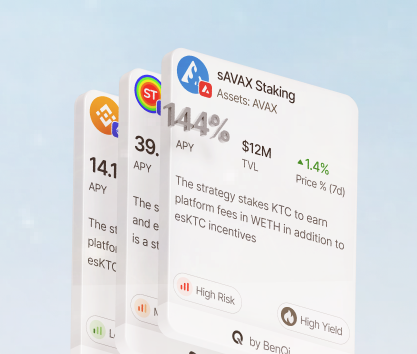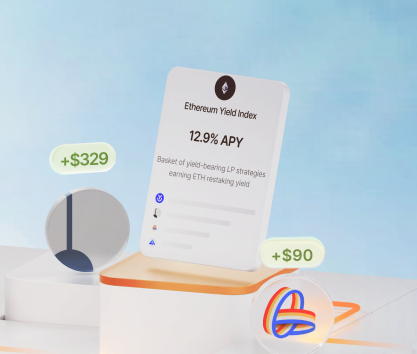Millions of crypto enthusiasts are attracted to the DeFi sector thanks to the non-custodial nature of investment operations where users remain in control of their assets. Since one of the reasons for the conception of Bitcoin in the first place was the inadequacies of centralized monetary systems and economies, it is only natural that users of cryptocurrencies are drawn to systems where they never have to give up ownership of coins or interact with corruptible middlemen and authorities.
Decentralized crypto wallets are the foundation of this growing sector as they act as enabling tools for users to keep full ownership of their tokens. As long as private keys are kept safe, you don’t have to worry about security because blockchain networks do not have a single point of failure meaning that you will always have access to funds due to the distribution of data across multiple nodes that can operate autonomously.
All DeFi protocols support decentralized wallets. For instance, the overwhelming majority of Ethereum-based platforms can automatically connect MetaMask, the most popular ERC-20 wallet out there used by almost all ETH holders. In some cases, investors who want to engage with a wide range of different digital assets across the DeFi ecosystem may have to set up several different wallet applications.
What is a decentralized wallet for cryptocurrencies?
If you need to interact with the blockchain, it is necessary to have an address in the chain associated with the user’s activity by acting as a unique identifier. While it is possible to use the address using the basic software required to access the blockchain, end users without technical expertise will struggle immensely. A crypto wallet is an interface that allows you to easily read the relevant on-chain data, send tokens, receive them, and check the integrity of the distributed ledger.
In many cases, the functionality is limited to just that which is more than enough for many users. However, one of the biggest trends in the industry is the addition of new features, interoperability, and better user interfaces. The latter is especially important given that up to 13.25% of all investors say that onboarding is the biggest issue preventing them from using the DeFi ecosystem according to RIF.
There are two main types of wallet applications:
- Software apps are designed for popular operating systems like Windows, Android, iOS, Linux, and others. They can also come in multiple forms. For example, MetaMask is mostly used as a browser extension for Chromium-based, Chrome, and Firefox browsers. On the other hand, Best Wallet is still exclusively a mobile-friendly app but the team promises to add a browser extension and a desktop version in the near future.
- Hardware devices like Ledger and Trezor are often chosen for their security and portability. Since private keys are stored locally and never shared online, the level of safety is much higher. Ledger S Nano has been a dominating force in the market for a long time with its compact design, convenient interface, and a long list of supported tokens (over 1,000). The latest version Stax was improved in many ways including a better UI implemented on a chemical ink display.
The optimal choice between these two categories boils down to your preferences, common uses, and safety. Users who interact with DeFi protocols frequently usually pick software as it is easier to quickly connect addresses to platforms. On the contrary, people who value security for long-term holdings commonly choose hardware devices and turn them into easily accessible cold storage vaults.
Decentralized crypto wallet security and reliability
Many tech enthusiasts point at the very apparent weakness of any application used for token management as they often connect to the internet and may store keys in ways that make them vulnerable to hackers. The safest option is still a piece of paper in a steel safe. However, the vast majority of software apps do not expose your information to the internet and store data in encrypted files that can accessed only by authorized users.
Here are some key advantages of using DeFi wallets:
- You don’t give up ownership of assets like in the case of CEXes where users are giving their coins to centralized entities hoping that it won’t mess up.
- Modern software wallets come packed with various features that allow users to manage their coins without stumbling over clunky UIs and incomprehensible technical documentation.
- Wallets like MetaMask are designed to interact with protocols without the need to transfer funds to a third party.
- You can use “standard” security measures like implementing two-factor authentication, using trustworthy networks, and never going to potentially dangerous websites.
Since wallets interact directly with the blockchain, you don’t have to worry about the safety or accessibility of funds as long as the network remains active. The reliability of your application depends wholly on the quality of your internet connection. In many senses, using these apps is a better choice compared to storing coins on CEX balances.
Contemporary applications for cryptocurrency storage have improved dramatically over the last decade. Two main aspects were prioritized the most:
- Security. Many new features were added to ensure better user protection. Among the most important ones are fully encrypted files storing private keys, multi-factor authentication, and more. It is harder than ever to lose funds if you follow appropriate safety protocols. In the overwhelming majority of cases, scammers use social engineering instead of trying to hack software.
- User experience. Modern applications are designed using the same techniques the best-rated mobile and desktop apps are using to ensure that users can get to their desired options and features without losing their minds. While the onboarding process is still harder compared to many tradfi apps, the difference between early UI designs and what we have now is quite impressive.
In addition to managing digital assets, you can also enjoy a wide range of complimentary features and services:
- Buying and selling crypto. In many cases, these decentralized wallets either come with embedded connections to partnered CEXes or as products by prominent centralized and decentralized exchanges. A good example is Gate.io with its direct access to the exchange of the same name.
- Portfolio tracking is another great feature that allows investors to keep tracking their assets across multiple chains without the need to switch apps. Trust Wallet, MetaMask, Best Wallet, and many other prominent applications have portfolio tracking tools.
- Connecting to DeFi protocols. Self-custody is one of the biggest advantages that decentralized finance has over tradfi. However, users would be way less interested in checking out the sector without an easy way to interact with protocols. Since many wallets allow users to connect in one click, you can use these apps to significantly simplify the investment process.
Decentralized crypto wallet fees and commissions
It is important to note that nearly all applications for asset management and storage are released by CEX and DEX platforms or have partnerships with certain exchanges. Many users demand features that allow for fast trading of assets in their wallets. Developers oblige as it is certainly a useful feature to have. However, commissions and fees may be higher if you compare them to trading directly on a CEX or a DEX platform.
Here are some reasons why:
- Additional fees may be taken by exchanges since they have to move funds in and out of their wallets which can incur additional gas fees and overhead expenses.
- Many wallets allow users to use their debit and credit cards to make purchases meaning that there are commissions by middlemen processing and settling fiat transactions.
- Slippages may occur due to insufficient liquidity and other circumstances. Many wallets simply do not display sufficient information about the market.
Decentralized crypto wallet risks and limitations
Finally, we need to discuss the elephant in the room. Security remains one of the biggest issues in the DeFi sector as consumers lack the protection usually extended by central authorities in controlled economies. While decentralized wallets appear to be impenetrable, some safety issues persist and must be considered by potential investors.
Here are ways in which your address can be compromised:
- You may lose private keys. A meme that says “not your keys, not your crypto” mirrors the reality where users must pay extra attention to seed phrases and how they are stored. In some extreme cases, users engrave secret words on precious metals and store them in metal safes. Such precautions are a little bit too much but you should be very careful with credentials.
- Software can be attacked regardless of safety measures in place. It is still possible for your desktop or even mobile to be compromised due to phishing attacks and malware. Many wallets have extra security features to prevent such attacks but no one is infallible. Staying safe and avoiding common mistakes is usually enough to protect your assets from phishing attempts.
- Regulation and compliance. These are issues that permeate the whole DeFi ecosystem with many protocols refusing to comply with KYC and AML practices as well as some security guidelines due to political, ideological, and many other reasons. You have to remember that investors take full responsibility for the safety of their assets.
These risks are substantial. However, understanding them and taking them seriously can be more than enough to prevent losses.
What is the best decentralized crypto wallet?
Searching for the most optimal application for cryptocurrency management can be quite challenging. Since many new investors in the sector are beginners, they may feel overwhelmed by the overabundance of options. We strongly recommend working with well-established tools that have strong communities and enough time to mature into highly efficient products.
Below are some great options available to all crypto enthusiasts:
- MetaMask is the most important app to get for any DeFi investor since all EMV-compatible protocols (those deployed on the Ethereum chain) support it directly allowing users to connect effortlessly in just a couple of clicks. The browser extension is very useful and comes with a variety of useful security features. MetaMask supports all ERC-20 tokens and NFTs minted within the Ethereum ecosystem and its many layer-2 networks.
- Trust Wallet is an excellent software solution for users who want to work with a wide range of different digital assets. It works even better if you want to interact with BSC-based DeFi protocols. Trust Wallet is partnered directly with Binance allowing users to buy crypto using debit and credit cards. Additionally, you can access a massive P2P marketplace and use a plethora of useful complementary features.
- Edge is a very interesting choice due to its focus on BTC-collateralized loans that are approved instantly. If you have crypto holdings and need money from time to time but don’t want to liquidate market positions, this particular feature is more than just useful. It can be a game changer for many people interested in entering the DeFi sector. Edge allows users to trade, store, and otherwise interact with a wide range of crypto tokens.
Do you need a decentralized wallet as an outsider to the DeFi industry?
The future of blockchain technology is very bright with many people around the world joining the world of crypto every year. We strongly believe that all people must start learning this tech as soon as possible and get practice with all sorts of Dapps. Wallets provide users with the necessary features to efficiently manage various types of digital assets. Understanding them is crucial since the rate of cryptocurrency adoption may skyrocket in the near future.









